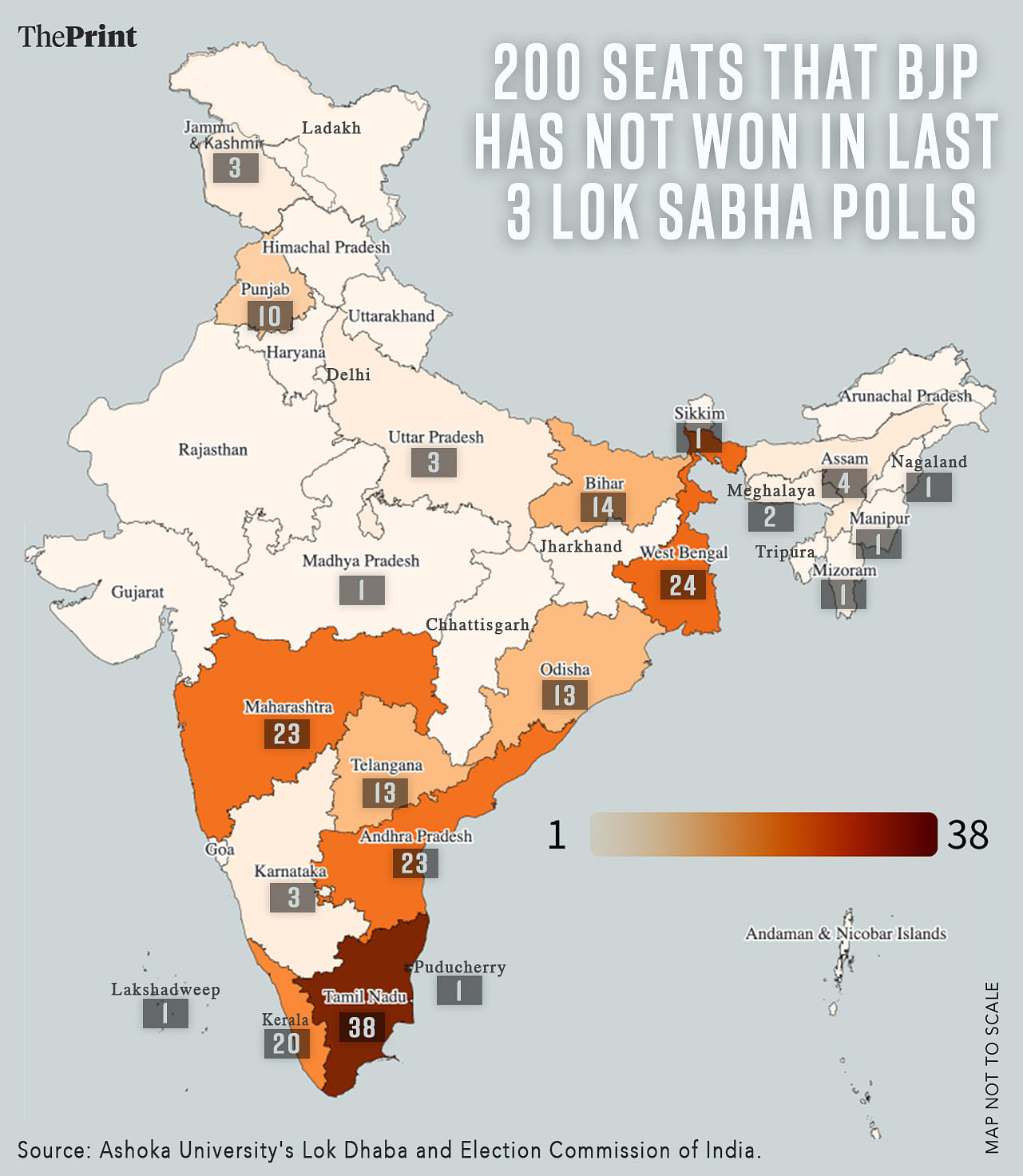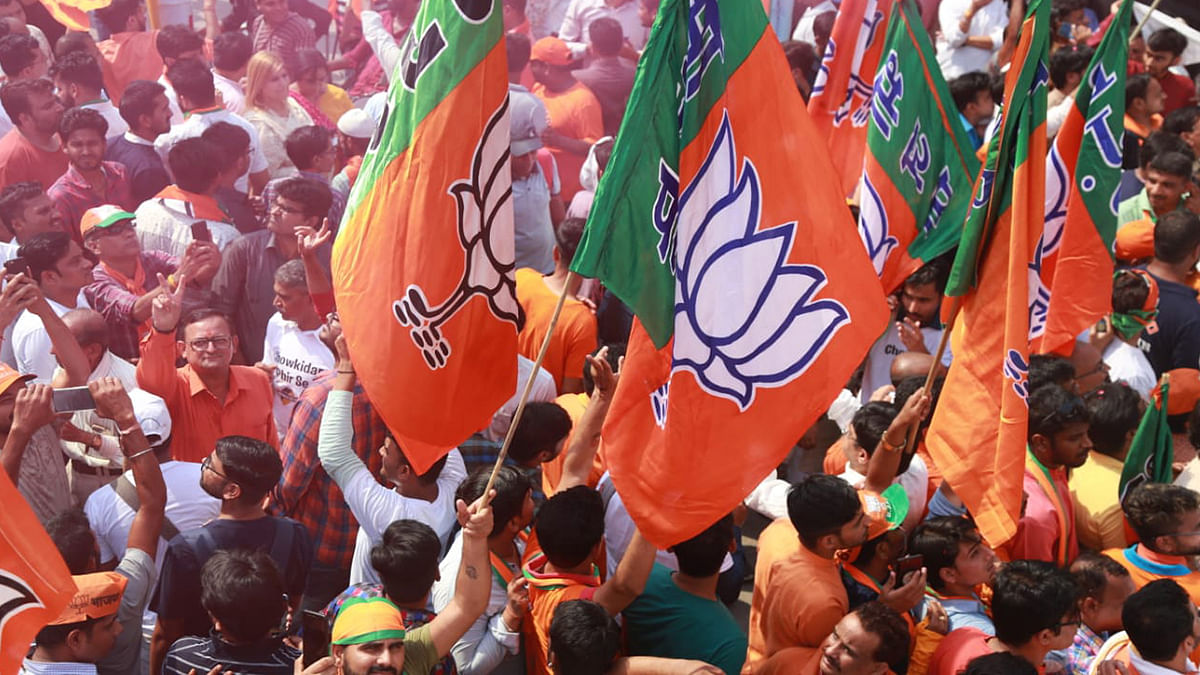New Delhi: Given that all political parties are immersed in calculations for the polls to the 18th Lok Sabha, the BJP will seemingly keep a close eye on at least 200 seats which it has not won even once in the last three general elections.
A close look reveals that most of these seats are in southern and eastern regions, exposing the BJP’s limited influence in the states that do not fall in the ‘cowbelt.’
Similarly, these seats are in states where the party is unable to make much inroads and depend on allies — some of whom have quit the National Democratic Alliance (NDA) — like the Shiv Sena in Maharashtra and the Janata Dal (United) in Bihar. As many as 94 seats were left for the allies in 2019.
While it lost the election in 2009, the BJP secured a majority on its own in 2014 (282 seats) and 2019 (303 seats). There are 224 seats where it won by over 50 percent vote share in 2019, highlighting its dominance in north, central and western India.
ThePrint analysed the Lok Sabha elections of 2009, 2014 and 2019, three successive elections held after the last delimitation.

Party leaders and political analysts believe that this would not be a major concern for the BJP, considering its performance in the last two years.
“If BJP hasn’t won 200 seats, there is also data that it won 224 seats with over 50 percent votes. If a party is unable to win a particular seat for the last many years, that is always a concern. But if a party has a sizable presence in a state and still doesn’t win a particular seat, then it is a major concern,” Prof. Sanjay Kumar, political analyst and psephologist, tells ThePrint.
He adds that while the BJP will try to expand in the South, “they know that even if they are unable to, that is not going to affect their chances in 2024”.
Also Read: 100% for BJD, 99% for DMK — electoral bonds a big chunk of ‘donations’ to regional parties in FY23
North-South divide
Tamil Nadu, Kerala and Andhra Pradesh account for 81 (two-fifth) of these 200 seats eluding the BJP. Additionally, Kerala is the only state where the BJP has never won a Lok Sabha seat among the three states. The party is pushing hard to make inroads in Kerala, with the PM making back-to-back visits to Thrissur and Kochi in January.
In Tamil Nadu and Andhra Pradesh, the BJP won one and two seats in 2014 but drew a blank in 2019. Narsapuram and Visakhapatnam went to the BJP In Andhra Pradesh where it had alliance with the Telugu Desam Party, while it won Kanyakumari in Tamil Nadu.
In the east, where the BJP has been growing foothold over the last few years, 24 seats in West Bengal and 13 in Odisha remain out of its reach in the last 15 years. Leaving two seats each in both the states where it stood third, BJP emerged runner up in the remaining 35 seats.
As for the Hindi heartland, apart from Bihar’s 14 seats, there are only three in Uttar Pradesh and one in Madhya Pradesh which withstood the BJP wave.
Chhindwara, bastion of Congress veteran Kamal Nath, remains out of bounds for the BJP. So have been the Gandhi family pocket borough of Rae Bareily and the Samajwadi Party stronghold Mainpuri in UP.
Additionally, the BJP hasn’t won Mirzapur, but that’s because it gave the seat to the Apna Dal (Soneylal), where its chief Anupriya Patel won in 2014 and 2019.
Of the 200 such seats, 47 are in Maharashtra, Bihar and Punjab. In the past three elections, whether in alliance or not, the BJP has not managed to win them. Of these 47, in 2019, the NCP stronghold of Baramati was the only seat where the BJP had fielded its candidate. Rest of the seats went to its allies
BJP leaders argue that the seats in Maharashtra and Bihar are not a major challenge as the party’s allies got votes in the name of PM Modi.
“In Maharashtra, the Shiv Sena is with us. Last time in Bihar, votes were given in the name of PM Modi,” BJP national spokesperson R.P. Singh says.“There is a vacuum in Punjab, like there was in West Bengal. We will fill it.”
Another BJP spokesperson Gopal Agarwal tells ThePrint that the party is not perturbed about places where erstwhile allies contested. “We are fighting on Modi ji’s name. We think his support base has increased. We would like all partners to come with us, and places where they have gone, we are expanding,” he says.
But, Sanjay Kumar says the party will have to put in a lot more effort in these seats. “If the party is unable to win a sizable number of seats in the last 3 elections in Maharashtra and Bihar, that does not give us a sense that BJP is very weak in these constituencies. It is only a functional thing,” the political analyst says. “It is also true that the BJP will have to put more effort there. They need to put extra efforts to energise the cadre and look for suitable candidates.”
Micromanagement of BJP
According to BJP leaders, the party is already working hard on the 200 seats for a long time now.
“On seats that we didn’t win, we have been working for the past two years. All our Union ministers were assigned seats to work on. They are already taking PM Modi’s schemes to the local people. They regularly keep a check on these seats. It’s an ongoing process. We are prepared for those 200 seats,” Singh says, adding that the BJP is set to open accounts in Kerala as well.
Agarwal says that the party has identified 160 seats where it came second or lost by a small margin. For instance, in West Bengal, the BJP lost Arambagh and Maldaha Dakshin by less than 10,000 votes. “There we have been working for 6 months. There is a huge focus on these seats,” he adds
On the other hand, Congress data analytics head Praveen Chakravarty points at another trend of the BJP.
“It’s not a surprise that the BJP is dominant in a few states and completely absent in others. Electorally, it is the most polarised party. Because when it is present in a state, it is completely dominant. When it is not, then it is completely absent,” he says, adding that this is the exact opposite of the Congress, “which has footprints in nearly every state”.
Chakravarty claims that in 2024, the BJP is set to be “completely wiped out of” Maharashtra, Tamil Nadu, Kerala, Telangana, Karnataka, Andhra Pradesh, Puducherry and adds these 200 seats will be advantageous for the INDIA bloc.
According to Dravida Munnetra Kazhagam (DMK) spokesperson Salem Dharanidharan, the data shows that there is an “inherent flaw” in our democracy. ”There are states which have higher numbers of seats, depending on population. It is possible that a party wins only in a few states in the north and they are able to form the government,” he says, referring to the BJP.
Dharanidharan says that he is confident that the BJP will not win a single of these 200 seats this year. He adds that now that the INDIA bloc has come together, even in states where the BJP is strong, it will be defeated because the “votes will combine”.
(Edited by Tony Rai)
Also Read: ‘Winnability’ over nari shakti? Only 13% of BJP’s candidates for upcoming state polls are women

